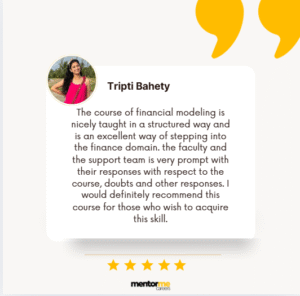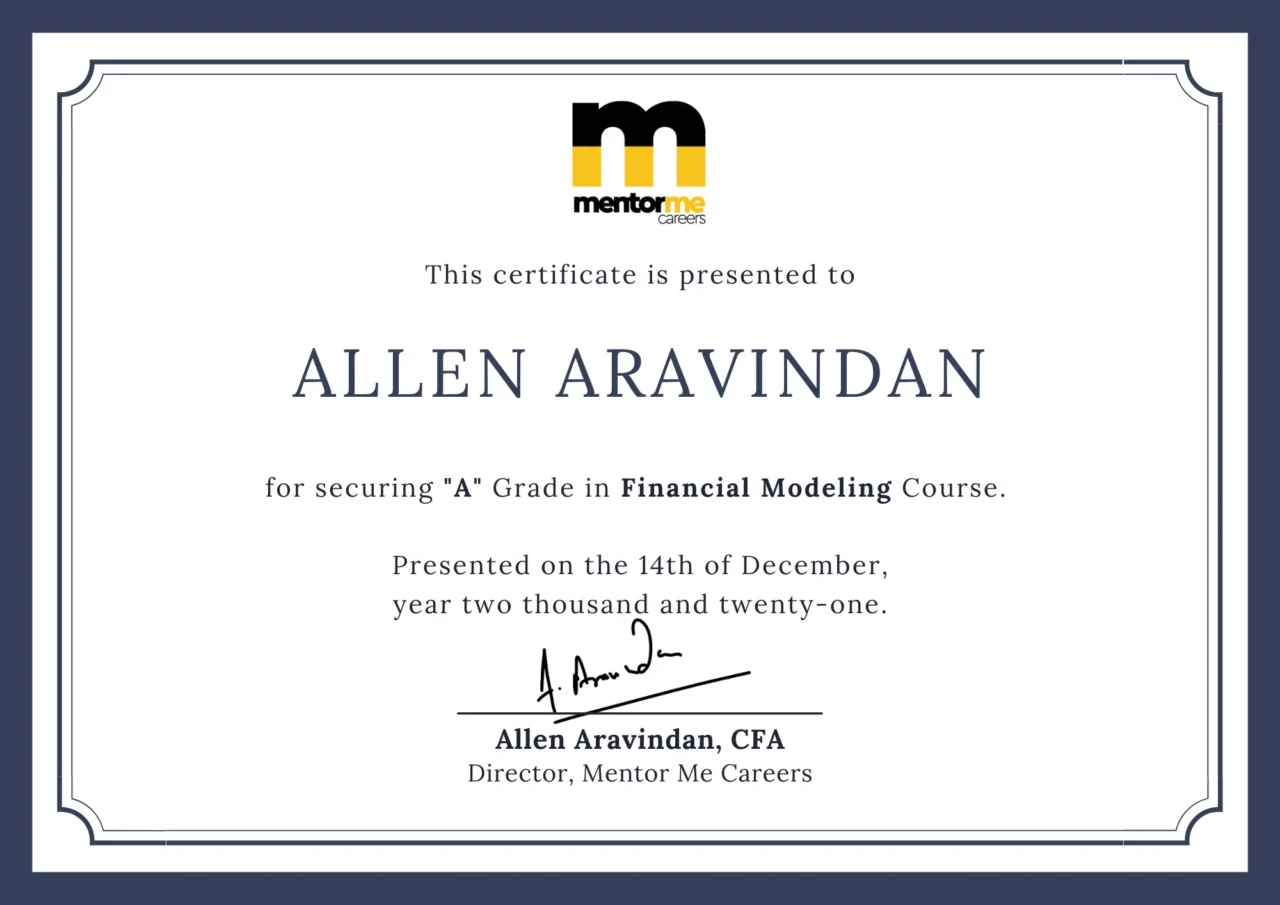Financial Modelling Course in Kolkata
Professional courses, such as Financial Modelling Course in Kolkata, are quite popular in today’s world that is driven by technology. Yes, technology is an integral part of everyone’s life, but then again it has created aspects of competition especially amongst the youths, like never before.
Our Kolkata batches now include cutting-edge topics like, AI in Excel, and Power BI for financial visualization Learn from industry veterans with hands-on experience in global valuations and core financial roles.
Why choose Mentor me careers?
100% Placement Assistance
Full Guidance
Depth in curriculum
Real world case studies
Knowledge that will help in placement
Experience faculties
Mock tests every-week
Interview training
Highlights of Financial modelling Course in Kolkata
Financial Modelling Course fees in Kolkata Fees

Financial Modeling Course
₹39,999 + GST
- 200 Hrs offline training
- Guaranteed Interviews
- 12 Specializations
- Lifetime Portal Access
Financial Modeling Offline Classes
₹45,999 + GST
- 200 Hrs offline training
- Guaranteed Interviews
- 12 Specializations
- Lifetime Portal Access
Financial Modeling Course Testimonials





Service 2026verified by TrustindexTrustindex verifies that the company has a review score above 4.5, based on reviews collected on Google over the past 12 months, qualifying it to receive the Top Rated Certificate.
Overview of Financial Modelling Course in Kolkata
As an institite of role-oriented skilling, we prepare the participants for employment in the field of investment banking and other financial institutions. Our instructors, who are seasoned professionals having worked at leading investment banking firms, deliver quality financial modeling training that encompasses all the latest pertinent material including real case studies and practical discussions in class. Those who do not want to make the full payment right away to reserve a seat can take advantage of a deferred payment scheme of which you pay 40 % fees at the time of enrollment and the remaining 60% upon successful placement with a complete placement assistance package to assist you which also includes contacts of previously placed students. Scheduling can be adapted to your preference, whether you choose to take a full time or a weekend batch.
Learning Journey with Mentor Me Careers’ Financial Modeling Course in Kolkata
The financial modeling course offered by Mentor Me Careers is intended to help individuals progress in their careers. This program is created by veterans of the field, and it aims to teach students how they can apply what they learn in school about finance to real-world situations. The material for this curriculum has been personally designed by retired investment bankers, credit analysts, and fund managers, so you know that everything covered will be relevant if your goal is working as an investment banker or equity researcher. We want each student who completes our comprehensive program either while still in college or already employed full-time elsewhere but looking for new opportunities within the industry itself – not only do we give them practical advice during lectures but also offer hands-on experience through various assignments such as creating models themselves based off different companies’ financial statements; this way nobody leaves without understanding how things actually work!
Syllabus
Our Excel workshop empowers participants with the knowledge needed for finance analyst roles in consulting, equity research or investment banking. The training starts from basic to advanced levels of excel skills so that every possible area is covered.
Key Learning Areas:
• Efficient navigation of excel using keyboard shortcuts
• Advanced techniques for sorting and filtering data
• Better management of data by freezing panes
• Making your presentation more impactful through conditional formatting
• Financial modeling linkages and formula creation
• SUM, PRODUCT, DIVISION, CONCATENATE are essential functions
• VLOOKUP, HLOOKUP and MATCH are functions used to lookup data
• You can combine functions to solve complex problems: VLOOKUP + MATCH; INDEX + MATCH; VLOOKUP + IF.
CAGR IRR EMI are examples of financial calculations.
Table usage and pivot table utilization will also be taught during this session.
Logical/reference functions such as IF SUMIF COUNTIF SUMIFS SUMPRODUCT should not miss out too!
So if you want a strong foundation in Excel or become an expert at it which is crucial for building efficient financial/business models then join us!
Curriculum of Advanced Excel Workshop
Our workshop takes you to the next level after mastering basic skills, focusing on complex formulas and advanced data analysis techniques in Excel. The emphasis is placed on using Excel for fast data analysis and presentation.
Advanced Formulas and Analysis:
Combining multiple functions (VLOOKUP + MATCH, INDEX + MATCH, VLOOKUP + IF)
Applying the OFFSET function
Techniques for Sensitivity Analysis
Application of Scenario Manager
Management of iterative calculations
Statistical Analysis (Correlation, Regression, Variance)
Summarizing data with INDIRECT function
Charting and Visualization:
Making appropriate charts (bar, pie etc.)
Using dynamic charts and Name Manager
Advanced chart types (Waterfall, Thermometer)
Charts with Sensitivity analysis
Charts with Form Controls that are interactive
Practical Application:
Building dashboards using advanced formulas, conditional formatting and charting techniques
PowerPoint Training: Creating impactful slides through data representation including effective charting as well as visual appeal.
Key Learning Outcomes:
Efficiently analyzing data with advanced excel functions
Professional charting & Data Visualization
Creation of comprehensive dashboards
Effective PowerPoint presentations fit for corporate standards.
This workshop equips you with practical skills needed for a finance analyst role where complex data analysis becomes simple yet impactful when presented.
No one can become a financial analyst without knowing accounting and financial statement analysis required for investment finance field for analysing the financial performance. The investment banking course offered by Mentor Me will teach you financial accounting , analysis, various line items from the basics.
Introduction to financial Analysis Framework– Annual report reading, Con Call reports, Quarterly reports, statement of change in equity, Supplementary information
Financial statement linkages and creating financial statement in excel
Income statement– Revenue recognition principles, Expense recognition principles, Diluted EPS, EPS, LIFO, FIFIO,AVCO
Balance Sheet– Format of balance sheet, current assets, current liabilities, Fixed assets, Non current liabilities
Cash flow statement– Format of cash flow statement, Direct method , Indirect method, FCFF, FCFEE
Ratio analysis– Solvency Ratios, Profitability ratios, Activity Ratios.
Ratio Analysis Case Study- Analyse persistent systems annual report
How to Read an annual Report step by step
Franchisee Business Model Valuation- NPV , IRR, Sensitivity analysis
Minority Interest, Impairment, Good will analysis
Once the finance fundamentals are set now its time to dig into creating financial models in practice. We will start applying all the concepts learnt into practical real life financial decision making. Check a project finance class here.
Start-Up Model Travel agency Business
You will learn how to think of the template of the business model. How a three statement financial model is made . Also you will learn how small business assumptions can make the decision making difficult
Manufacturing Plant Business Modeling
In this financial model you will learn how funding complications affect the model. Interest capitalisation, Construction phasing , Soft cost and hard cost of projects will be taught in this section
Tax Modeling
Tax is an important part of investment decision making calculation. Taxation is much more complicated than calculating 30% of the PBT. Here you will learn tax loss carry forwards, Carry forward loss set off, Minimum alternate tax, MAT Credits, MAT Set off,Deffered tax liability & Deffered Tax Asset. All of this practically using excel
Manufacturing Plant Set Up Model
This is a real model of the industry made from scratch using real world assumptions and calculations. You will learn what it means to work in a industry level financial model from zero. All the complications thrown into one project finance case. You also learn how to create deb schedule with various interest rate calculations.
Real estate valuation model
Trading Comps Valuation Technique
Investment bankers and finance professionals widely use the trading comps valuation method, which compares a company with other similar companies to find its market value. In this course you will learn:
Building Trading Comps: From choosing peers to analyzing final output.
Understanding Multiples: How they are compared and used, the reasons for their differences, and how to deal with them.
Detailed Analysis:
Constructing analyses (enterprise value, latest twelve months, cleaning financials, calculating multiples)
Convertible securities impact, leases, R&D expenses
Different multiples in same sector and why they vary
IPO valuation multiples
Regression analysis on multiples
Industry relevant multiple
High growth vs low multiple scenarios
Differences among industry multiples and their drivers
Peer selection when there are no similar listed companies available
By taking this comprehensive approach you will be able to use trading comps effectively for accurate company valuation.
Investment bankers use the precedent transaction method or deal comps as a vital valuation technique to supplement trading comps and DCF valuation. To find out what a deal is worth, this method looks at past deals that have been done under similar circumstances.
Key Points:
Building Transaction Comps: Involves calculating transaction multiples, cleaning up financials, benchmarking multiples among others.
Comparative Study: The distinction between transaction and trading comps.
Controlling Premium: Its effect on multiples and how to measure it.
Right Situations: When to apply transaction comp multiples for accurate valuation.
Market behavior is better understood through this approach which also assists in valuing firms based on historical transactions data.
Check out our demo class of financial modeling valuation .
This is the final section before the specialization kicks in. In this section we will take a publicly listed company from NSE stock exchange and create a DCF Valuation Model and Relative /Comparable analysis financial model. This is one of the other applications of financial modeling in decision making. This model is specifically useful for people who want to pursue to join equity research and Investment banking
Valuation Basics- DCF, Gordon growth, WACC, Cost of equity , Levered, Un levered Beta, Terminal Value
Creating a model template
Data collection and data feeding in financial model
Revenue Driver- breaking the business into Price and quantity metrics, so that you can forecast those metrics
Cost Driver
Debt Schedule , Asset schedule Forecast
Free Cash flow calculation
DCF Valuation Calculation
Sensitivity Analysis
Report Writing
This is our major success metric at Mentor Me, your placement. With over a decade of experience in this field, we have developed resources and process which will make you polished for the interview and job in investment banking and research. This module will include
Employability quizzes for each skill tested in the interview
Case studies practice for interview
Written test question bank
Mock Interviews- Face to face
Stress Interviews
CV Edits and recommendation
Soft Questions practice for HR Rounds
More and more finance Jobs require candidates to know the basics of python. In the Financial modeling course with placement in the weekday program we cover
- Python basics
- Data Sets
- Data visualisation using matplotlib and seaborn
- Linear and logistic Regression machine learning models using python.
Case study for finance on python.
Module 1: Power BI Set up
Learn the basic set up requirements of Microsoft Power BI & Overview of the major functionalities.
Module 2: EDA Using Power BI
Learn how to use the easy to use power BI Functionalities, to explore the data. Before beginning any analysis further
Module 3: Data Visualization with Reports Learn how to create beautiful charts and data presentation using Power BI
Module 4: Dashboards using Power BI
Learn how to create powerful interactive dashboards to summarize the data analysis in Power B
- Sql introduction
- SqL Operators
- Data tables in SQL
- Major Sql functions
- SQL Data base
- 4 Technical Mocks
- Interview cases role wise
- Face to face advice questions in finance
- General Market Questions
- Practice Questions
- Vocabulary Training
- Role Play
- Non Verbal Communication
- Difficult HR Questions
Financial servies industry, asset management industry basiscs, overview of portfolio management
Resume Building & LinkedIn Optimization Workshops
Soft Skills Training – Communication, Pitching & Interview
Sector-specific Financial Statement Forecasting
Recorded Sessions for Flexibility
Internship Opportunities during the Course (Kolkata only)
12 Comprehensive Specialisations
Mergers models are A+B=C or A+B= A. The purpose of this kind of a model is to actually find the synergies and cost benefits.
M&A Merger Model Explained
A merger model predicts how much money shareholders of the new company will make in the future. It indicates whether a deal is beneficial or harmful to shareholders’ earnings.
Important Features:
• Building The Model: Making an integrated merger model that can evaluate transaction effects.
• Deal Structure Impact: How stock deals or cash deals affect future earnings.
• Synergies: Pro forma earnings should include anticipated synergies.
• Debt Refinancing: Existing debt in the target company needs to be accounted for when adjusting.
More Things You Can Learn:
• Complete overview of M&A process
• PowerPoint basics for presentations
• Drafting Letters Of Interest and Intent
• Fundamental Merger Model concepts
• Access to model files and detailed M&A notes
This method helps us understand financial implications during mergers and acquisitions completely.
A Leveraged Buyout (LBO) is when a company buys another company primarily with external debt.
Valuation: The target company’s worth is analyzed.
Transaction Assumptions: Major presumptions for the purchase.
Debt Assumptions: Conditions of the borrowed money.
Goodwill Calculation: Establishing intangible value.
Closing Balance Sheet: Financial standing after acquisition.
Income Statement: Expected revenues and costs.
Balance Sheet: Overall fiscal condition after LBO completion.
Cash Flow Statement (CFS): Money movements in and out.
Key Metrics: Success measurement for LBOs
LBO Files: All-inclusive modeling files for review
This framework guarantees an exhaustive comprehension of leveraged buyouts and their monetary consequences.
One of the favorites of the industry, because of its large contribution to India’s GDP. A very engaging model to make and easily understandable
Learn about the renewable energy project finance case on solar business. Learn its challenges, accounting assumptions and return potential
Aviation is more than just tickets. The major complication of making a aviation Model is the lease calculations and forecasting of it in the future
Education industry has changed over the years and is one of the most sought after business for investment banks. Learn how to model and value such business

Industry Recognised Certification Mentor Me Careers
Mentor Me Career's financial modelling course in Kolkata comes with a built in Industry recognized certification
Expert Faculties

Nikhil Jain, CFA
Expertise: Credit Analysis, Financial Statement Analysis, Risk Management
Our trainers are seasoned experts from buy-side and sell-side firms with experience in credit underwriting portfolio management, and valuation across real estate, retail, and technology sectors
Finance Recruiters in Kolkata
ICRA Ratings 17th Floor, Plot – G, Infinity Benchmark, 1, GP Block, Sector V, Kolkata, West Bengal 700091
Crisil:57, Chowringee Rd, Gokhel Road, Elgin, Kolkata, West Bengal 700071
Price water house:
SBI capital markets:kolkata. 1, Middleton Street, Jeevandeep Building, 9th floor, Kolkata – 700 071.
The Best Placements Process:Financial Modelling Course in Kolkata
We follow a success-based placement fee model you get guranteed interviews with the placement course. Our partnerships across Kolkata’s investment banking and consulting ecosystem also open doors for internship opportunities during the course.
Goal Setting
Baselining
Profile Building
Job Applications
Mock Interviews
Success
FAQ's :Financial Modelling Course in Kolkata
A Financial Modeling and Valuation course teaches you how to develop professional financial models and perform valuation analyses. It covers crucial topics such as discounted cash flow (DCF) valuation, comparative company analysis, and advanced Excel functions to enhance your financial decision-making skills.
To register for our live program, simply contact our counselors who will guide you through the registration process and provide all necessary details to get started.
Yes, having a basic understanding of accounting is necessary. MentorMeCareers provides pre-lecture study material to ensure that students have a strong foundation before attending the course, making the in-class experience more fruitful
This course is designed for finance professionals, analysts, investment bankers, corporate finance managers, and anyone interested in mastering the art of financial modeling and valuation techniques.
Graduates can explore career paths in investment banking, equity research, financial consulting, corporate finance, and asset management. The skills gained through the course are also valuable for entrepreneurs and other finance-related roles.
For the live course, you will attend 80 sessions of 3 hours each, totaling 240 hours of training. The recorded version of the course offers around 150 hours of high-quality content.
While there is no job guarantee, we provide robust placement support with numerous opportunities for core finance roles. Your success in securing a job will depend on a range of factors, including your performance and market conditions.
Upon completing this course, you can target finance roles such as Valuation Analyst, Investment Banker, Portfolio Manager, and other core finance positions.
Yes, select students from each batch are shortlisted for internship roles with our partner companies based in Kolkata across investment banking, equity research, and credit advisory domains.
Absolutely! We offer <strong>recorded sessions in addition to live classes so you can learn at your own speed, revisit concepts, and never miss a lesson.
Know More About Financial Modeling
Financial Modeling Videos

14:42

8:05




